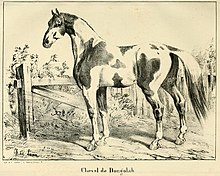Dongola horse
 Engraving from the Dictionnaire d'hippiatrique et d'équitation
by François-Joseph-Zanobi-Gaëtan Cardini, 1848 | |
| Conservation status | not at risk[1]: 149 |
|---|---|
| Other names |
|
| Country of origin | Sudan |
| Distribution | |
| Use | riding |
| Traits | |
| Height |
|

The Dongola or Dongolawi is an African breed of riding horse. It is predominantly of Barb type, though there may have been some Arab influence in the past. It originated in the Dongola province of Sudan, for which it is named. In eastern Africa it is distributed in the northern part of Sudan and in western Eritrea; it is also present in several West African countries including Cameroon, Chad and the Central African Republic. A number of local West African breeds or types derive from it; they may be regarded as sub-types, or may be reported as separate breeds.
History
[edit]Regional variants of the Dongola include:
- the West African Dongola in Cameroon and the Central African Republic, usually dark or black with extensive white markings to the legs and sometimes to the belly[4]: 461
- the Bahr-el-Ghazal or Dongola breed of the Bahr-el-Ghazal region of Chad, which stands about 148–152 cm, weighs some 350–400 kg, and is usually dark with extensive white markings to the legs and sometimes to the belly;[5]: 29 [6] it may also be called the Kréda or Ganaston[2]: 404
- the Bornu of north-eastern Nigeria[4]: 462
- and the Haoussa or Hausa in northern Nigeria and parts of Niger.[4]: 462
A number of local West African breeds or types derive from cross-breeding Dongola and Barb stock; they may be regarded as sub-types of the Barb or of the Dongola, or may be reported as separate breeds. They include:[4]: 462
- in Burkina Faso, the Mossi and, in the northern part of the country, the Yagha or Liptako
- in Mali, the Bandiagara or Gondo, a light horse of about 150–152 cm, normally either bay or grey, and the Songhaq or Songhoï[7]
- in central Niger, the Djerma, a light horse seen in dark coat colours
- in Nigeria, the Nigerian, which stands about 142–147 cm and is used for riding, for light traction and for pack work.
Characteristics
[edit]The Dongola usually has a convex profile.[4]: 461
References
[edit]- ^ Barbara Rischkowsky, D. Pilling (eds.) (2007). List of breeds documented in the Global Databank for Animal Genetic Resources, annex to The State of the World's Animal Genetic Resources for Food and Agriculture. Rome: Food and Agriculture Organization of the United Nations. ISBN 9789251057629. Archived 23 June 2020.
- ^ a b c Élise Rousseau, Yann Le Bris, Teresa Lavender Fagan (2017). Horses of the World. Princeton: Princeton University Press. ISBN 9780691167206.
- ^ Breed data sheet: West African Dongola / Central African Republic (Horse). Domestic Animal Diversity Information System of the Food and Agriculture Organization of the United Nations. Accessed September 2020.
- ^ a b c d e f Valerie Porter, Lawrence Alderson, Stephen J.G. Hall, D. Phillip Sponenberg (2016). Mason's World Encyclopedia of Livestock Breeds and Breeding (sixth edition). Wallingford: CABI. ISBN 9781780647944.
- ^ [Laboratoire de Recherches Vétérinaires et Zootechniques de Farcha, Ministère de l’Elevage] (2003). Rapport National sur les Ressources Zoogénétiques du Tchad (in French); annex to The State of the World's Animal Genetic Resources for Food and Agriculture. Rome: Food and Agriculture Organization of the United Nations. ISBN 9789251057629. Archived 17 May 2018.
- ^ Breed data sheet: Bahr-El-Ghazal / Chad (Horse). Domestic Animal Diversity Information System of the Food and Agriculture Organization of the United Nations. Accessed September 2020.
- ^ Breed data sheet: Songhoï / Mali (Horse). Domestic Animal Diversity Information System of the Food and Agriculture Organization of the United Nations. Accessed September 2020.
